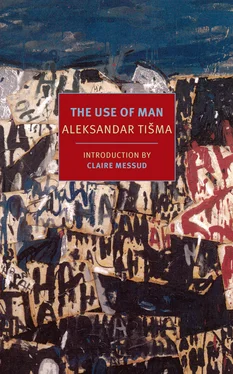Aleksandar Tišma - The Use of Man
Здесь есть возможность читать онлайн «Aleksandar Tišma - The Use of Man» весь текст электронной книги совершенно бесплатно (целиком полную версию без сокращений). В некоторых случаях можно слушать аудио, скачать через торрент в формате fb2 и присутствует краткое содержание. Год выпуска: 2014, Издательство: NYRB Classics, Жанр: Современная проза, на английском языке. Описание произведения, (предисловие) а так же отзывы посетителей доступны на портале библиотеки ЛибКат.
- Название:The Use of Man
- Автор:
- Издательство:NYRB Classics
- Жанр:
- Год:2014
- ISBN:нет данных
- Рейтинг книги:5 / 5. Голосов: 1
-
Избранное:Добавить в избранное
- Отзывы:
-
Ваша оценка:
- 100
- 1
- 2
- 3
- 4
- 5
The Use of Man: краткое содержание, описание и аннотация
Предлагаем к чтению аннотацию, описание, краткое содержание или предисловие (зависит от того, что написал сам автор книги «The Use of Man»). Если вы не нашли необходимую информацию о книге — напишите в комментариях, мы постараемся отыскать её.
A work of stark poetry and illimitable sadness,
is one of the great books of the 20th century.
The Use of Man — читать онлайн бесплатно полную книгу (весь текст) целиком
Ниже представлен текст книги, разбитый по страницам. Система сохранения места последней прочитанной страницы, позволяет с удобством читать онлайн бесплатно книгу «The Use of Man», без необходимости каждый раз заново искать на чём Вы остановились. Поставьте закладку, и сможете в любой момент перейти на страницу, на которой закончили чтение.
Интервал:
Закладка:
She went to work at the Post Office, to the dining room for lunch and supper, then home to rest. She filled out, her skin grew tauter, her hair became silky, flowing. “What do you wash your hair with?” her colleagues asked, touching enviously the thick red cascade. They envied her beauty, she could feel it. A circle of mistrust formed around her; the offers to visit ceased; Mara, who had invited her to see her place, stopped mentioning it. Only official invitations came to Vera, tossed from desk to desk, typed sheets of paper with spaces for signatures that were mandatory. These were meetings, called “conferences,” of Youth, of the Popular Front, and were usually held in the early evening in the front hall of the Post Office. Stern new faces emerged in the light of the electric bulbs, among them the personnel officer, a hard, sharp woman, Comrade Jurković, who delivered a speech about lateness for work and the time wasted in talking. She read out a list of the names of the guilty parties, directing a glance at each one in the rows of chairs and benches. Roll call, it suddenly came back to Vera, and her throat tightened in fear. Would she be singled out, accused, ordered to take off her clothes, and tied to a pillar in the hall? Would each blow on her body be counted out loud? She broke into a sweat. She looked at the faces around her, terrified faces, like those of the girls in the house of pleasure when the Barrackenälteste passed between the beds, tapping the back of her boot with a whip. Vera had to be obedient, to hide any resistance. At the thought of how much easier it was here than in the camp, she almost cried out with happiness. She set her face in an expression of admiration and kept it that way until the end of the meeting.
She made a point of getting to work ahead of time; her colleagues would find her at her desk early in the morning, bent over papers. Several weeks later, Gordana Sekulić, a pale, unpleasant young woman, invited her for a walk after lunch. It was late autumn; a fierce wind blew right through them, and there was nowhere to take shelter. Gordana, shivering, became impatient. “Can we go to your place?” she asked Vera. Wary, Vera said no, and they went back to the Post Office. The cleaners were shuffling up and down the corridor; the room was being aired. Gordana shut the window, and they sat down on cold chairs opposite each other. Vera lit a cigarette. Gordana screwed up her face and, with her eyes fixed on the desk, spoke of the aims of socialism — humanitarianism and justice — aims certainly dear to Vera after what she had suffered. She, Gordana, had been entrusted, by the older comrades, with the task of inviting Vera to join the League of Young Communists. And Gordana raised her troubled, almost tearful eyes and asked tensely, “Will you?” To which Vera simply nodded. Gordana jumped up, hugged her, kissed her with cold lips, seized her hand, and the two ran down the stairs and out into the street, where the wind, whistling, drove dust and scraps of paper.
The next day, Gordana gave Vera a questionnaire and some sheets of blank paper to write her biography. “You mustn’t leave anything out,” Gordana said before placing the paper in Vera’s hands, “particularly anything that concerns the Occupation. That’s what Danica Jurković told me to tell you.” Vera was supposed to return the papers within three days. That same afternoon, with some difficulty, for the questions were complicated, she filled out the questionnaire and at once set about writing her biography. She was surprised by how little there was to say once she had given the details of her family; so much of her suffering, she realized, was general, and the personal could not be recounted. But, remembering what Gordana had told her, she tried to put the unutterable on paper. The crucial events, it seemed to her, ought to be described in the minutest detail, but they were in disorder, unconnected, and connecting them in memory would cause immeasurable distress. She tried to generalize, but that didn’t work, for her generalizations quickly degenerated into half-truths and therefore falsehoods. She threw the sheet of paper away, took another, and in a fury of decision hurled herself on that past which was suddenly demanded of her. But the words wouldn’t come. She lay down, writhing in her impotence. She would have liked to rest, but her heart went on hammering, would have liked to run out into the street, but hadn’t enough breath left to move. She was a prisoner of those blank sheets of paper, as she had been a prisoner in the camp.
This was camp, too, she realized, a continuation of camp, the camp in which she had been walled for a year and a half. The war had ended, but she had not escaped; her former captors, drowned in blood, even in death, stretched out their arms to her, to her captivity. She shouldn’t have come back, she remembered, she should never have come back; she had made a mistake coming back, and now would pay for it. She tried to think of a way out. Go somewhere? But where? Apart from this house that everyone had abandoned, there was only one other: a wooden hut in a field fenced off with wire. There was no one there now, its inhabitants gone, a place of disgrace, a monument to its visitors — forced to visit it — full of judgments on the past. But she was part of that past and, although a victim, as guilty as the guilty.
She lit a cigarette, put on her coat, went to a nearby grocery, and bought a bottle of wine. She never drank, she never wanted to drink, but people said it numbed you. The wind was bitter and cold. She forced herself to gulp it down, but her stomach rebelled, and she ran out of her room to be sick. Broken, deprived of relief, she lay down and went to sleep. Heavy dreams, water, drowning, rain and snow in the square, on the roll call.
Morning found her listless. She went to work late, with dark circles under her eyes. She worked silently, angrily. The girl who sat next to her, Stasa Dimitrijević, a doctor’s daughter, asked in a low voice what was wrong. Vera shrugged, barely able to hold in her hatred. Gordana, whose eyes she noticed looking at her worriedly, came up after work and asked if the application was ready. “It isn’t and never will be,” Vera replied with a decisiveness that surprised herself. “I’m sick of the whole thing!” Gordana recoiled as if bitten by a snake and hurried off. Vera felt delivered of a great weight. She went to the dining room, sat among strangers, then went home and lay down. After a short sleep, she drank what was left of the wine, drank it straight from the bottle, turned the bottle upside down and let the last few yellow drops fall on the papers scattered on the table.
Gordana, a few days later, was waiting for her in the corridor. “I told Danica you’re not going to do your biography. Is that still true?” When Vera said it was, Gordana said, “Then it’s as if we never had our talk. Return the questionnaire to me.”
“It’s already filled in.”
Gordana thought a moment. “That doesn’t matter. Return it anyway. It shouldn’t be left lying around.”
After lunch, at home, the first thing Vera did was clear the table of the papers, crumpling them up with disgust, with pleasure, and burning them in the kitchen stove, which had not seen fire for a long time. Then she sat down with the questionnaire and carefully crossed out, in thick ink, every word she had written. Now, following the questions was a row of black dashes, long and short. First name, last name: nothing. Father’s name: nothing. Mother’s name, maiden name: nothing. Day, month, year of birth: nothing. She was nothing, and she folded that nothing, put it in her coat pocket, and the next day placed it on the desk in front of Gordana. Soon thereafter the telephone rang, and she was summoned to Danica Jurković. She went up the stairs and found the personnel officer at her desk, her back bent almost double, her eyes tired, her face sagging and lined.
Читать дальшеИнтервал:
Закладка:
Похожие книги на «The Use of Man»
Представляем Вашему вниманию похожие книги на «The Use of Man» списком для выбора. Мы отобрали схожую по названию и смыслу литературу в надежде предоставить читателям больше вариантов отыскать новые, интересные, ещё непрочитанные произведения.
Обсуждение, отзывы о книге «The Use of Man» и просто собственные мнения читателей. Оставьте ваши комментарии, напишите, что Вы думаете о произведении, его смысле или главных героях. Укажите что конкретно понравилось, а что нет, и почему Вы так считаете.












